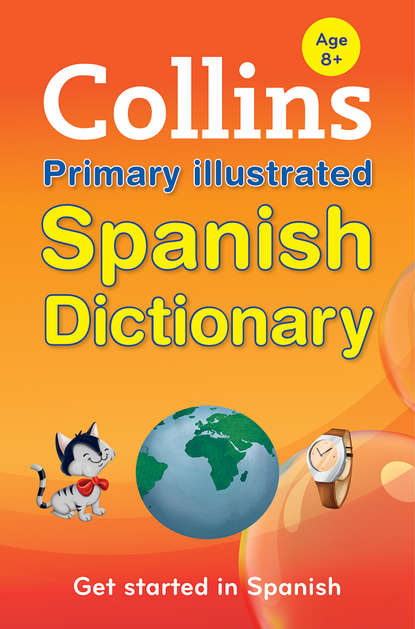
Полная версия:
Collins Primary Dictionaries
2 as Como ella no llegaba, me fui. As she didn’t arrive, I left. Lo usé como cuchara. I used it as a spoon.
3 if Como lo vuelvas a hacer se lo digo a tu madre. If you do it again, I’ll tell your mother.
4 about Vinieron como unas diez personas. About ten people came. como si as if Siguió leyendo, como si no hubiera oído nada. He kept on reading, as if he had heard nothing.
cómo ADVERB
how ¿Cómo se dice en inglés? How do you say it in English? ¿Cómo están tus padres? How are your parents? ¿Cómo es de grande? How big is it? ¿Cómo es el clima? What’s the weather like? Perdón, ¿cómo has dicho? Sorry, what did you say? ¡Cómo! ¿Mañana? What? Tomorrow?
cómodo (FEM cómoda) ADJECTIVE
comfortable un sillón cómodo a comfortable chair
el compañero la compañera NOUN
1 classmate

2 workmate
3 partner
la compañía NOUN
company Ana vino a hacerme compañía. Ana came to keep me company.
comparar VERB
to compare Siempre me comparan con mi hermana. I’m always being compared to my sister.
compartir VERB
to share
el compás (PL los compases) NOUN
compass
la competición (PL las competiciones) NOUN
competition
el complejo NOUN
complex Tiene complejo porque está gordo. He’s got a complex about being fat. un complejo deportivo a sports complex
completo (FEM completa) ADJECTIVE
full Los hoteles estaban completos. The hotels were full. Me olvidé por completo. I completely forgot.
complicado (FEM complicada) ADJECTIVE
complicated
la compra NOUN
shopping
ir de compras to go shopping
comprar VERB
to buy Quiero comprarme unos zapatos. I want to buy a pair of shoes.
comprender VERB
to understand ¡No lo comprendo! I don’t understand it!
común (FEM común) ADJECTIVE
common un apellido muy común a very common surname No tenemos nada en común. We have nothing in common. Hicimos el trabajo en común. We did the work between us.
la comunidad NOUN
community
con PREPOSITION
with Vivo con mis padres. I live with my parents. ¿Con quién vas a ir? Who are you going with? Lo he escrito con bolígrafo. I wrote it in pen. Voy a hablar con Luis. I’ll talk to Luis. con tal de que no llegues tarde as long as you don’t arrive late
la concha NOUN
shell
el concurso NOUN
competition
la condición (PL las condiciones) NOUN
condition a condición de que apruebes on condition that you pass El piso está en muy malas condiciones. The flat is in a very bad state. No está en condiciones de viajar. He’s not fit to travel.
conducir VERB
to drive Mi madre no sabe conducir. My mum can’t drive.
el conductor la conductora NOUN
driver
conduzco VERB ▷see conducir Siempre tomo mucho cuidado cuando conduzco. I’m always very careful when I’m driving.
el conejo NOUN
rabbit

la conferencia NOUN
lecture
confesar VERB
to admit Confesó que había sido él. He admitted that it had been him.
la confianza NOUN
trust Tengo confianza en ti. I trust you. No tiene confianza en sí mismo. He has no self-confidence.
confiar VERB
to trust No confío en ella. I don’t trust her.
confieso VERB ▷see confesar Confieso que estaba equivocado. I admit I was wrong.
conformarse VERB
conformarse con to make do with Tendrás que conformarte con uno más barato. You’ll have to make do with a cheaper one.
confundir VERB
1 to mistake La gente me confunde con mi hermana. People mistake me for my sister.
2 to confuse Su explicación me confundió todavía más. His explanation confused me even more. Confundí las fechas. I got the dates mixed up.

congelado (FEM congelada) ADJECTIVE
frozen
el congelador NOUN
freezer
congelar VERB
to freeze Me estoy congelando. I’m freezing.
el conjunto NOUN
group un conjunto de música pop a pop group
conmigo PRONOUN
with me ¿Por qué no vienes conmigo? Why don’t you come with me? Rosa quiere hablar conmigo. Rosa wants to talk to me. No estoy satisfecho conmigo mismo. I’m not proud of myself.
conocer VERB
1 to know Conozco a todos sus hermanos. I know all his brothers. Nos conocemos desde el colegio. We know each other from school.
2 to meet La conocí en una fiesta. I met her at a party.
conocido (FEM conocida) ADJECTIVE
well-known un actor muy conocido a well-known actor
el conocimiento NOUN
consciousness perder el conocimiento to lose consciousness
conozco VERB ▷see conocer No la conozco. I don’t know her.
conseguir VERB
to get Él me consiguió la entrada. He got me the ticket.
el consejo NOUN
advice ¿Quieres que te dé un consejo? Would you like me to give you some advice?
consigo
consigo can be a pronoun or part of the verb conseguir.
A PRONOUN
1 with him Se llevó a Marta consigo. He took Marta with him.
2 with her
3 with you
B VERB ▷see conseguir No consigo olvidarme de lo que pasó. I can’t forget what happened.
constipado
constipado can be and adjective or a noun.
A (FEM constipada) ADJECTIVE
estar constipado to have a cold
B MASC NOUN
cold coger un constipado to catch a cold
Language tip
Be careful! constipado does not mean the same as constipated.
construir VERB
to build
la consulta NOUN
surgery horas de consulta surgery hours
consultar VERB
to consult

Deberías consultar a un médico. You should consult a doctor. Tengo que consultarlo con mi familia. I need to discuss it with my family.
contagioso (FEM contagiosa) ADJECTIVE
infectious
la contaminación NOUN
pollution la contaminación del aire air pollution
contar VERB
1 to count Sabe contar hasta diez. He can count to ten.
2 to tell Les conté un cuento a los niños. I told the children a story. Cuéntame lo que pasó. Tell me what happened. Cuento contigo. I’m counting on you.
el contenido NOUN
contents el contenido de la maleta the contents of the suitcase
contento (FEM contenta) ADJECTIVE
happy Estaba contento porque era su cumpleaños. He was happy because it was his birthday. Estoy contento con la bici nueva. I’m pleased with my new bike.
contestar VERB
to answer Contesté a todas las preguntas. I answered all the questions. Me escribieron y tengo que contestarles. They wrote to me and I have to reply to them.
contigo PRONOUN
with you Quiero ir contigo. I want to go with you. Necesito hablar contigo. I need to talk to you.
el continente NOUN
continent
contra PREPOSITION
against Eran dos contra uno. They were two against one. El domingo jugamos contra el Málaga. We play against Málaga on Sunday.
contrario (FEM contraria) ADJECTIVE
1 opposing
2 opposite Los dos coches iban en dirección contraria. The two cars were travelling in opposite directions. Ella opina lo contrario. She thinks the opposite. Al contrario, me gusta mucho. On the contrary, I like it a lot. De lo contrario, tendré que castigarte. Otherwise, I will have to punish you.
la contraseña NOUN
password
el control NOUN
control Nunca pierde el control. He never loses control.
la conversación (PL las conversaciones) NOUN
conversation Necesito clases de conversación. I need conversation classes.
convertir VERB
to turn Convirtieron la casa en colegio. They turned the house into a school.
■ convertirse en to become/to turn into
Language tip
convertirse en has two meanings. Look at the examples.
Se convirtió en un hombre rico. He became a rich man. Se convirtió en una pesadilla. It turned into a nightmare.
la copa NOUN
glass

la copia NOUN
copy hacer una copia to make a copy
copiar VERB
to copy copiar y pegar to copy and paste
el corazón (PL los corazones) NOUN
heart
el cordón (PL los cordones) NOUN
shoelace
la corona NOUN
crown
la correa NOUN
1 lead
2 strap
correcto (FEM correcta) ADJECTIVE
correct Las respuestas eran correctas. The answers were correct.
el corredor la corredora NOUN
runner

corregir VERB
1 to correct Corrígeme si me equivoco. Correct me if I’m wrong.
2 to mark El profesor corrigió los exámenes. The teacher marked the exams.
el correo NOUN
post Me lo mandó por correo. He sent it to me by post. Correos the post office correo electrónico email
correr VERB
1 to run Tuve que correr para coger el autobús. I had to run to catch the bus.
2 to hurry Corre que llegamos tarde. Hurry or we’ll be late.
3 to go fast No corras tanto, que hay hielo en la carretera. Don’t go so fast, the road’s icy.
4 to move Córrete un poco hacia la izquierda. Move a bit to the left.
la corriente NOUN
1 current
2 draught
corrijo VERB ▷see corregir Ahora mismo lo corrijo. I’ll correct it right away.
cortado (FEM cortada) ADJECTIVE
1 sour
2 chapped
3 closed
cortar VERB
to cut Corta la manzana por la mitad. Cut the apple in half. Me corté el dedo. I cut my finger. Te vas a cortar. You’re going to cut yourself. Estas tijeras no cortan. These scissors are blunt. Fui a cortarme el pelo. I went to get my hair cut.
el corte NOUN
cut Tenía un corte en la frente. He had a cut on his forehead. un corte de pelo a haircut

Me da corte pedírselo. I’m embarrassed to ask him.
la corteza NOUN
crust
la cortina NOUN
curtain
corto (FEM corta) ADJECTIVE
short Susana tiene el pelo corto. Susana has short hair.
la cosa NOUN
thing ¿Qué es esa cosa redonda? What’s that round thing? Cogí mis cosas y me fui. I picked up my things and left. ¿Me puedes decir una cosa? Can you tell me something? ¡Qué cosa más rara! How strange!
cualquier cosa anything
coser VERB
to sew
las cosquillas NOUN
hacer cosquillas a alguien to tickle somebody Tiene muchas cosquillas. He’s very ticklish.
la costa NOUN
coast Pasamos el verano en la costa. We spent the summer on the coast.
costar VERB
to cost Cuesta mucho dinero. It costs a lot of money. Me costó diez euros. It cost me ten euros. Las matemáticas le cuestan mucho. He finds maths very difficult.
¿Cuánto cuesta? How much is it?
la costilla NOUN
rib
la costumbre NOUN
1 habit Tiene la mala costumbre de mentir. He has the bad habit of lying.
2 custom una costumbre británica a British custom Se le olvidó, como de costumbre. He forgot, as usual.
cotillear VERB
to gossip
crecer VERB
to grow Me crece mucho el pelo. My hair grows very fast. ¡Cómo has crecido! Haven’t you grown!
creer VERB
1 to believe Nadie me cree. Nobody believes me. ¿Crees en los fantasmas? Do you believe in ghosts?
2 to think No creo que pueda ir. I don’t think I’ll be able to go.
Creo que sí. I think so. Creo que no. I don’t think so.
la crema NOUN
cream Me pongo crema en las manos. I put cream on my hands. la crema solar suncream
la cremallera NOUN
zip Súbete la cremallera. Do your zip up.
el cristal NOUN
1 glass una botella de cristal a glass bottle En el suelo había cristales rotos. There was some broken glass on the floor.
2 window pane Los niños rompieron el cristal. The children broke the window pane. limpiar los cristales to clean the windows
el cromo NOUN
picture card
la croqueta NOUN
croquette croquetas de pollo chicken croquettes
el cruce NOUN
crossroads En el cruce hay un semáforo. There are traffic lights at the crossroads. un cruce de peatones a pedestrian crossing
crudo (FEM cruda) ADJECTIVE
raw las zanahorias crudas raw carrots
crujiente (FEM crujiente) ADJECTIVE
crunchy
la cruz (PL las cruces) NOUN
cross
cruzar VERB
1 to cross
2 to fold Nos cruzamos en la calle. We passed each other in the street.
el cuaderno NOUN
notebook

un cuaderno de ejercicios an exercise book
la cuadra NOUN
stable
cuadrado (FEM cuadrada) ADJECTIVE, MASC NOUN
square dos metros cuadrados two square metres
el cuadro NOUN
painting
cual PRONOUN (PL cuales)
1 who el primo del cual te estuve hablando the cousin who I was telling you about
2 which la ventana desde la cual nos observaban the window from which they were watching us
cuál PRONOUN (PL cuáles)
1 what No sé cuál es la solución. I don’t know what the solution is.
2 which one ¿Cuál te gusta más? Which one do you like best? ¿Cuáles quieres? Which ones do you want?
cualquier ADJECTIVE ▷see cualquiera
cualquiera (FEM cualquiera)
cualquiera can be an adjective or a pronoun.
A ADJECTIVE
any Puedes usar un bolígrafo cualquiera. You can use any pen. No es un empleo cualquiera. It’s not just any job.
cualquier cosa anything en cualquier sitio anywhere
B PRONOUN
1 anyone Cualquiera puede hacer eso. Anyone can do that. cualquiera que le conozca anyone who knows him
2 any one Me da igual, cualquiera. It doesn’t matter, any one. en cualquiera de las habitaciones in any one of the rooms cualquiera que elijas whichever one you choose
3 either ¿Cuál de los dos prefieres? — Cualquiera. Which of the two do you prefer? — Either.
cuando CONJUNCTION
when Lo haré cuando tenga tiempo. I’ll do it when I have time. Puedes venir cuando quieras. You can come whenever you like.



